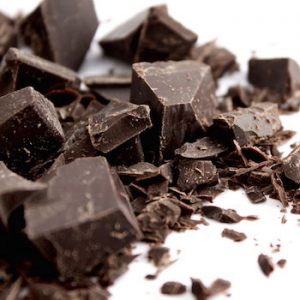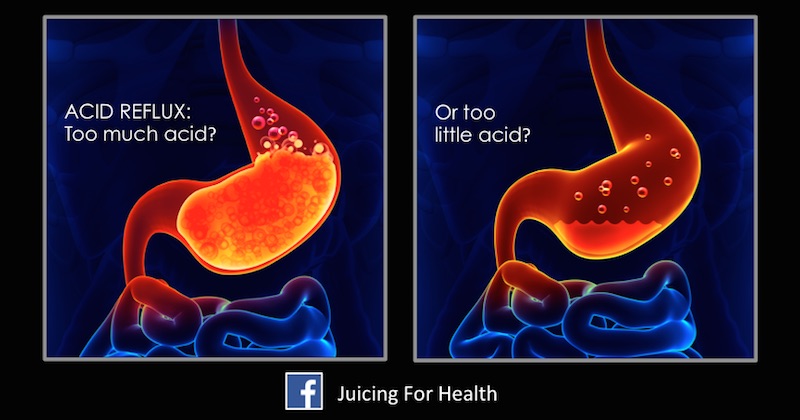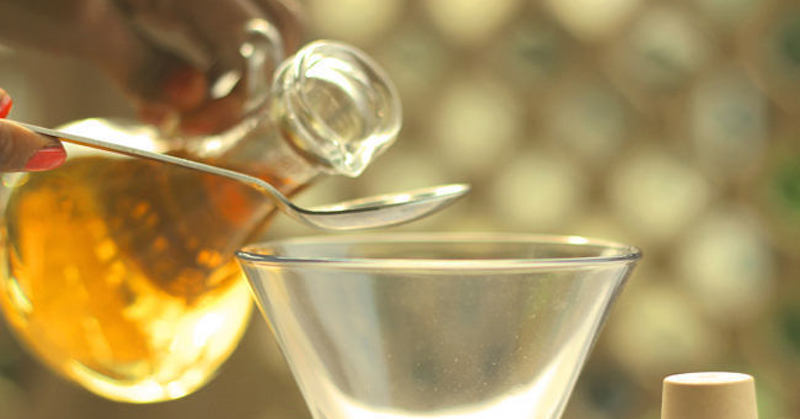Acid Reflux: How To Test If You Have Low Or High Stomach Acid
Last updated on
Acid reflux is also termed heartburn and GERD (gastro-esophageal reflux disease). It causes chest pain, sore throat and a burning sensation to the stomach, throat and sometimes mouth.
Common sense would suggest that acid reflux is due to too much stomach acid, however it can often be due to too little stomach acid, obstruction of the upper bowels or a weak lower esophageal sphincter (LES).
Foods That Can Weaken The LES:
Fish oil (dietary and supplementary)
- Tomatoes
- Citrus fruits and juices (orange, lemon, lime, etc.)
- Peppermint
- Alcohol
- Nicotine
- Caffeine
- Some medications (ie. SSRI, hormonal treatments)
- And YES …. Chocolate
Chocolate has been shown to decrease lower esophageal sphincter (LES) pressure. There’s actually a term called, “Chocolate-Induced Reflux”
The LES is the muscle that joins the esophagus to the stomach. It is a valve that opens to allow food and drinks into the stomach, while closing to stop food and stomach acids from coming up. It opens and closes like a purse-string, similar to your lips when you pucker them.
If the LES is weak, it allows the contents in the stomach (ie. food and digestive enzymes) to flow back and cause irritation. Similarly, if there is high pressure in the stomach from a small intestine obstruction or even small intestinal bowel overgrowth (SIBO), it can weaken the LES.
If not treated properly, acid reflux can cause damage to the delicate mucosal membrane and potentially lead to ulcers and cancer. It’s important to avoid trigger foods, eat in a relaxed state and chew your foods thoroughly.
Too Much Or Too Little Stomach Acid?
How do you know if you have too much or too little if the symptoms are the same?
If your symptoms are mild, you are not likely to want to go to the doctor’s office for a check-up because may think that it will just ‘go away on it’s own’.
If you have acid reflux, there’s a test that you can do at home to determine if you have too much or too little stomach acid—Apple Cider Vinegar.
Acid Reflux Test – Low/High Stomach Acid
- Swallow 1 tsp of undiluted apple cider vinegar.
- If you experience no burning or sensations, you probably have hypochlorhydria (low stomach acid) and need to increase your stomach acid levels by subsequently adding 1 tbsp of apple cider vinegar each day until you reach 6 tbsp/d or a slight burning sensation arises.
- If no symptoms arise, maintain that dose per day and only decrease by 1 tbsp a day, unless burning is felt.
If you experience extreme burning and irritation with just 1 tbsp of apple cider vinegar then you likely have hyperchlorhydria (excess stomach acid).
Ensure that the burning pain you experience is not a heart condition or peptic ulcer by going to your family doctor and having the appropriate tests run.
What To Do If You Have LOW Stomach Acid?
- Continue dosing 1–6 tsp of apple cider vinegar per day if no burning sensation is felt
- Take digestive enzymes after bigger meals
- Eat more pineapple and papaya for their natural bromelain and papain enzymes
- Chew your food more thoroughly
- Be mindful when you eat. Start by taking 3 deep breaths before a meal and really smell your food. Your nose is the first step in digestion funny enough because it triggers salivary secretions of the mouth and digestive enzyme release from the pancreas
- Abdominal massage to encourage gastric secretions
- Stress management. Meditation, deep breathing, gratitude, etc.
- Read more about low stomach acid reflux.
Most likely you have low stomach acid. Learn more about what you can do.
What To Do If You Have HIGH Stomach Acid?
- Avoid acidic foods (vinegar, citrus fruits and meats), smoking, carbonated beverages and food triggers (spicy food, pineapple, papaya, chocolate, tomatoes, alcohol, caffeine, etc) for 1 week and re-assess intensity of discomfort
- Start dosing 1-2 tsp of sodium bicarbinate (aka. baking soda) in a full glass of water per day (not a long-term solution).
- Eat smaller meals and foods that are easy to digest (ie. juices and smoothies)
- Drink lots of water
- Be mindful when you eat. Start by taking 3 deep breathes before a meal
- Stress management. Meditation, deep breathing, gratitude, etc.
- Eat a few hours before bed.
- Don’t lie down immediately after eating.
- Sleep more and with your head slightly elevated.
- Weight loss, moderate exercise.
- Abdominal and upper body massage to relieve gastric pressure and stress.
Acid reflux can be very uncomfortable and stressful when eating at restaurants or parties. It can also ruin intimate evenings when you’re doubled over in pain.
Heartburn can be confused with peptic ulcers, musculoskeletal issues, serious heart conditions and lung conditions. If you have been experiencing chronic discomfort, notice any bleeding from the mouth or stool (black coffee ground poo) or cannot find a pattern of causes for your pain, please see a medical doctor immediately.
If you’ve been on acid-suppressing pharmaceuticals for some time now and wish to come off of them or switch to a more natural approach, visit a Naturopathic doctor. Never self-prescribe or abruptly stop medications as the body has become reliant on the drugs and will need a period of weaning off and reintroduction of alternative therapies.
This article was originally written by Dr. Alison Chen, ND and is republished here with permission.

Some of the links I post on this site are affiliate links. If you go through them to make a purchase, I will earn a small commission (at no additional cost to you). However, note that I’m recommending these products because of their quality and that I have good experience using them, not because of the commission to be made.

 Fish oil (dietary and supplementary)
Fish oil (dietary and supplementary)

































 JOIN OVER
JOIN OVER
Comments